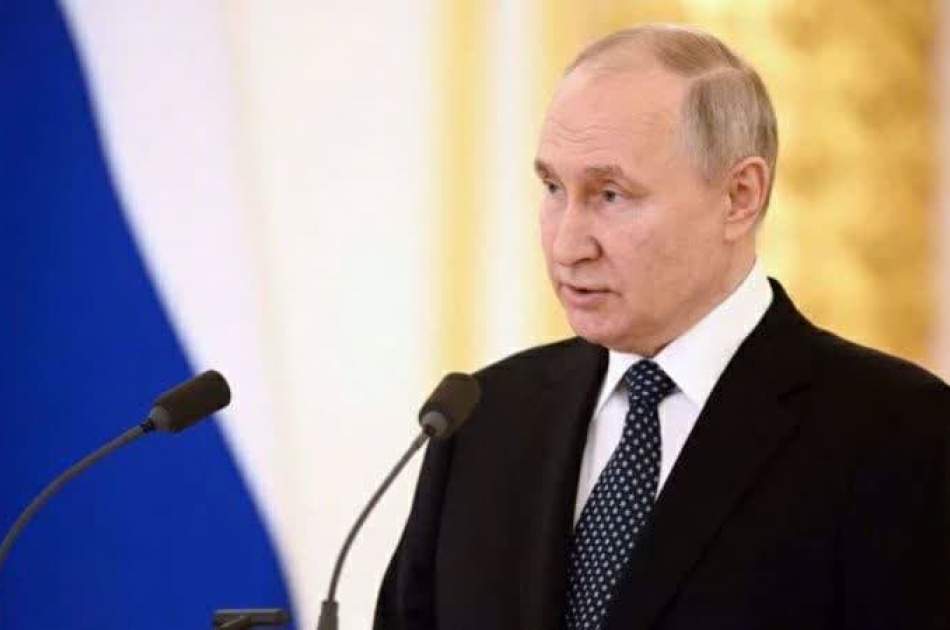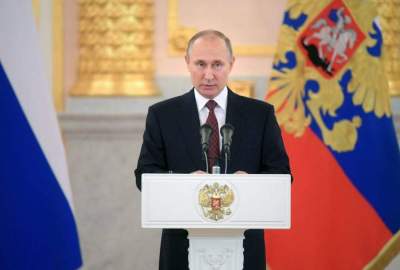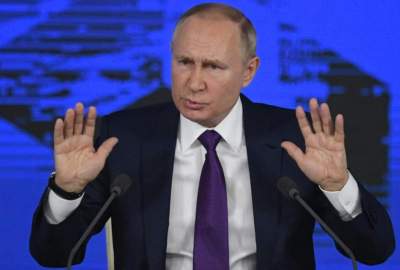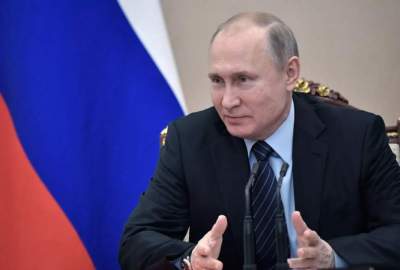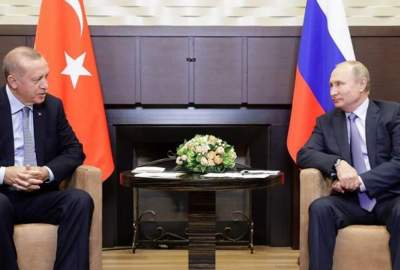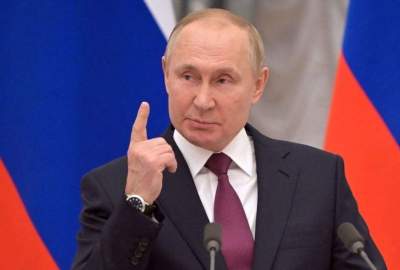The President of Russia has said that the West, led by the United States, is trying to divide the country into dozens of different states by creating divisions between ethnic and national groups in Russia.
Publish dateMonday 22 May 2023 - 10:44
Story Code : 270445
Afghan Voice Agency (AVA) - Monitoring: Speaking on Friday via video link at a meeting of Russia's Council on Interethnic Relations, Putin said, “They say Russia should be divided up into tens of different states.”
He added that the more sanctions the West hits Russia with, the greater the level of cohesion within Russian society.
Putin noted that the opponents of the Russian nation will continue to try to rock the country from within by using agents and marginal persons.
"Our eternal geopolitical rivals and adversaries are using their agents inside the country, as well as a partially withdrawn abroad network of agents and various kinds of marginal persons, to try and keep trying to rock our country from within," he pointed out.
"But we must remember that they [agents of Russia's opponents] exist and will continue to be used for their purposes by those who want to influence us, they will be used in their fight against Russia," he stated.
"And the struggle will continue, no doubt. Our geopolitical opponents have been doing it for centuries, they are doing it now, and they will certainly do it in the future," Putin noted. "As they say in such cases, no fantasy," he pointed out.
"They are going to improve this tool, and we have to keep this in mind," Putin concluded.
The Russian leader's remarks came as the West was making preparations to slap new sanctions against Russia over the ongoing Ukraine crisis.
G7 leaders, who will be joined this weekend by Ukrainian President Volodymyr Zelensky, pledged to restrict any exports to Russia that could help the nation reach the objectives of the special military operation launched by Moscow in Donbas in late February 2022.
Zelensky is scheduled to arrive in Japan late on Saturday after taking part in the Arab League summit in Saudi Arabia.
In a similar move, G7 leaders said in a statement that the restrictions slapped on Russia would cover exports of industrial machinery, tools and technology useful to the Russian campaign in Ukraine, while efforts would be pursued to limit Russian revenues from trade in metals and diamonds.
An early draft of the final communique, which is still subject to change, said that in regard to China, which the G7 is trying to portray as a threat to global economic security, the groups need to take measures to "reduce excessive dependencies" in critical supply chains and counter "malign practices" in technology transfer and data disclosure.
The G7 statement urges the need for peace in the Taiwan Strait while calling on the Chinese leadership to persuade the Kremlin’s leaders to cease Russia’s military operation in Ukraine.
However, it also stated the leaders of the G7 were in agreement that China's status as the world's second-largest economy necessitated efforts to foster their continuous cooperation with the industrial powerhouse.
"Our policy approaches are not designed to harm China, we do not seek to thwart China's economic progress and development," it stated, insisting that the G7 group wanted "stable and constructive" relations with China.
The three-day meeting of the G7, which is comprised of the United States, Japan, Germany, Britain, France, Italy and Canada, is being held in Hiroshima, Japan, where the US dropped a nuclear bomb 78 years ago at the end of World War Two, killing tens of thousands of its inhabitants and reducing the city to rubble.
Meanwhile, a raft of previous Western sanctions imposed on Russia has proved to be ineffective.
Kiev has called on its Western allies to go further in isolating Russia, for example by tightening loopholes in the financial sector that allow Moscow to circumvent the sanctions.
Russia has denounced both the bans and the West's incessant arming of Kiev as counterproductive measures that would only prolong the conflict.
Last month, Putin condemned the "economic aggression" that is being practiced by the "collective West" against the country, pledging that Moscow will take "proactive" action against the West's hostile economic campaign.
Putin, who was addressing Russia’s Council of Legislators in St. Petersburg, urged Russian lawmakers and other authorities to work "proactively" against the Western economic measures slapped on the nation rather than just "waiting out" the tough times.
He called for the creation of a "basis for the long-term, independent, and successful development of our country."
He added that the more sanctions the West hits Russia with, the greater the level of cohesion within Russian society.
Putin noted that the opponents of the Russian nation will continue to try to rock the country from within by using agents and marginal persons.
"Our eternal geopolitical rivals and adversaries are using their agents inside the country, as well as a partially withdrawn abroad network of agents and various kinds of marginal persons, to try and keep trying to rock our country from within," he pointed out.
"But we must remember that they [agents of Russia's opponents] exist and will continue to be used for their purposes by those who want to influence us, they will be used in their fight against Russia," he stated.
"And the struggle will continue, no doubt. Our geopolitical opponents have been doing it for centuries, they are doing it now, and they will certainly do it in the future," Putin noted. "As they say in such cases, no fantasy," he pointed out.
"They are going to improve this tool, and we have to keep this in mind," Putin concluded.
The Russian leader's remarks came as the West was making preparations to slap new sanctions against Russia over the ongoing Ukraine crisis.
G7 leaders, who will be joined this weekend by Ukrainian President Volodymyr Zelensky, pledged to restrict any exports to Russia that could help the nation reach the objectives of the special military operation launched by Moscow in Donbas in late February 2022.
Zelensky is scheduled to arrive in Japan late on Saturday after taking part in the Arab League summit in Saudi Arabia.
In a similar move, G7 leaders said in a statement that the restrictions slapped on Russia would cover exports of industrial machinery, tools and technology useful to the Russian campaign in Ukraine, while efforts would be pursued to limit Russian revenues from trade in metals and diamonds.
An early draft of the final communique, which is still subject to change, said that in regard to China, which the G7 is trying to portray as a threat to global economic security, the groups need to take measures to "reduce excessive dependencies" in critical supply chains and counter "malign practices" in technology transfer and data disclosure.
The G7 statement urges the need for peace in the Taiwan Strait while calling on the Chinese leadership to persuade the Kremlin’s leaders to cease Russia’s military operation in Ukraine.
However, it also stated the leaders of the G7 were in agreement that China's status as the world's second-largest economy necessitated efforts to foster their continuous cooperation with the industrial powerhouse.
"Our policy approaches are not designed to harm China, we do not seek to thwart China's economic progress and development," it stated, insisting that the G7 group wanted "stable and constructive" relations with China.
The three-day meeting of the G7, which is comprised of the United States, Japan, Germany, Britain, France, Italy and Canada, is being held in Hiroshima, Japan, where the US dropped a nuclear bomb 78 years ago at the end of World War Two, killing tens of thousands of its inhabitants and reducing the city to rubble.
Meanwhile, a raft of previous Western sanctions imposed on Russia has proved to be ineffective.
Kiev has called on its Western allies to go further in isolating Russia, for example by tightening loopholes in the financial sector that allow Moscow to circumvent the sanctions.
Russia has denounced both the bans and the West's incessant arming of Kiev as counterproductive measures that would only prolong the conflict.
Last month, Putin condemned the "economic aggression" that is being practiced by the "collective West" against the country, pledging that Moscow will take "proactive" action against the West's hostile economic campaign.
Putin, who was addressing Russia’s Council of Legislators in St. Petersburg, urged Russian lawmakers and other authorities to work "proactively" against the Western economic measures slapped on the nation rather than just "waiting out" the tough times.
He called for the creation of a "basis for the long-term, independent, and successful development of our country."
avapress.net/vdcbagb5srhbzap.4eur.html
Tags
Top hits
